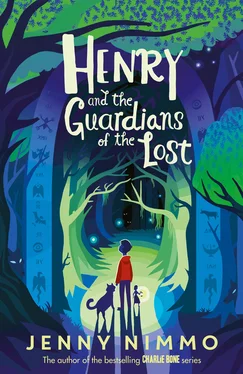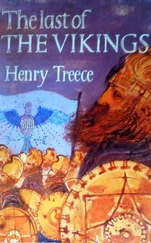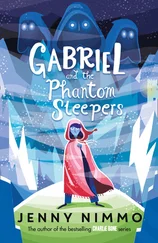‘Get a move on.’ Herbert spoke from the shadows beyond the door. ‘You’re letting the outside in.’
Nervously clenching his fists, Henry stepped over the threshold. He had the oddest sensation of moving backwards, not forwards. He shook his head, and hunched his shoulders as Herbert closed the door behind him. The air was filled with whispers.
Facing Henry, on the other side of a musty-smelling hallway, was a wide wooden staircase. It rose to a landing where a large gilt-framed mirror reflected nothing but dust. Henry’s legs felt all at sea as the flagstones beneath his feet dipped into hollows and then rose unexpectedly.
A shaft of light brightened the hall as Herbert opened a door and proudly announced, ‘The kitchen.’
Henry thought, It’s just a kitchen. But as he stepped into the room he realised that it was not just a kitchen. It could better be described as an experience. The walls rose up and up until they reached a domed glass ceiling. The huge skylight was made of hundreds of topaz-coloured panes, giving the whole place the look of an old-fashioned photograph.
Below the ceiling two great oak beams ran the length of the room. They were hung with copper saucepans, cauldrons, bowls, ladles and other utensils the like of which Henry had never come across. They were all so far out of reach he wondered if anyone ever used them. And then he became aware of a stepladder, the tallest he had ever seen, and almost at the top, a very, very tiny woman.
‘Hullo!’ the tiny person squeaked. ‘You’re late.’
‘I know,’ said Henry.
‘Better late than never, eh?’ said Herbert. ‘Henry, meet Twig.’
‘Are you hungry?’ asked Twig.
‘A bit,’ Henry admitted.
Twig then did the most extraordinary thing. She leapt from the ladder, on to the top of a vast dresser. Every shelf was crammed with cracked and stained crockery, all piled higgledy-piggledy; plates balanced on bowls, cups teetering on one another. How it all stayed put was a mystery.
Bending over, Twig selected a large plate from the top shelf. Tucking this under one arm she bounced back on to the ladder, skimmed halfway down, and jumped on to the impossibly long table. It was only then that Henry saw the girl. She sat at the very end of the table. Behind her a window as wide and as tall as four doors rose above a giant stone sink. The girl’s hair was as red as a flame. She was reading a book and took no notice of Henry whatsoever.
Twig ran across the table and peered into Henry’s face. Her own was brown and leathery, but she had gentle dark eyes and a kind smile. She wore a long pink dress, a blue checked apron and furry slippers. Her brown hair was cut very short and her small pink ears were set unusually high on her head. The tip of her long nose was as active as a finger.
‘Will eggs do?’ Twig asked Henry.
‘Eggs will do very well,’ he said. He had eaten rather a lot of eggs recently, but one more wouldn’t hurt, he reasoned, and he was very hungry again. He glanced at the red-haired girl and sat on a chair some distance from her.
‘Ankaret, it would be nice if you could be polite for once,’ Herbert said, throwing a disapproving look in the girl’s direction.
She didn’t respond.
‘Perhaps she’s deaf,’ said Henry.
That did the trick. The girl looked up with a scowl. Her face was as pale as paper, her eyes were green and her nose and cheeks were covered in freckles. ‘I happen to be reading a very interesting book,’ she said, ‘and I haven’t got time for small-talk.’
Henry had never been one to give up easily. ‘My name’s Henry,’ he said. ‘I suppose yours is Ankaret. Unusual name, if you don’t mind me saying.’
No response.
From the corner of his eye Henry had been watching Twig. In a matter of seconds she had shinned up the ladder, brought down a frying pan and rolled two eggs from under a chicken sitting in an old armchair. Now she was standing on a stool and frying the eggs in a peppery-smelling oil.
The stove crackled, the eggs sizzled and the topaz sunlight made the copper pans gleam. Henry felt almost at home.
At the very end of the room, half-hidden by the vast dresser, a door suddenly opened and a boy poked his head in. ‘I smell eggs,’ he said. ‘Can I have one?’ He came into the room and stood beside the stove.
‘You’ve just had tea,’ said Herbert.
‘Have I?’ The boy jerked his thumb at Henry. ‘Who’s he?’
‘Why don’t you ask him?’ said Herbert.
‘I’m Henry,’ said Henry, before he could be asked.
‘I’m Markendaya, or Mark,’ the boy said solemnly. ‘I come from India.’ He was small and rather skinny. ‘Are you the new rover?’
‘I suppose so,’ said Henry, without knowing what it was.
‘You were expected yesterday.’ Mark came round to Henry’s side of the table and sat next to him. ‘Did you get lost?’
‘I was hi-jacked,’ Henry stated.
Mark emitted a knowledgeable grunt. ‘That happened to someone else.’
‘What about you?’ asked Henry. ‘What did you –?’
‘Don’t!’ Mark stood up and made for the door. ‘Don’t ask me,’ he mumbled.’ I don’t want to talk about it.’ And then he was gone.
Herbert sighed and Twig tut-tutted.
Ankaret didn’t even raise her head.
After a moment Henry asked, ‘Did I say something wrong?’
‘He doesn’t like to talk about his first life.’ Twig walked sedately across the table, carrying Henry’s plate of eggs. She set the plate before him and provided him with a knife and fork. Henry assumed it must be OK to walk on tables in this particular house. He wondered what Pearl would have said. At least Twig’s slippers looked reasonably clean.
There was a sudden loud shout from somewhere in the house. This was followed by several thumps on the staircase. The hanging pots and pans shivered and tinkled, but no one paid any attention.
Glancing nervously at the swinging pans above him, Henry thanked Twig for the eggs.
‘You’re welcome.’ Twig dipped her head. Then she screamed.
It was such a shrill, heart-stopping sound, Henry dropped his knife and fork. Ankaret raised her head at last, and put her hands over her ears.
Twig was staring at something behind Henry and, looking round, he saw that Enkidu had appeared in the doorway.
‘Cat! Cat!’ shrieked Twig, pointing a trembling finger at Enkidu.
‘Oh dear, I thought this might happen,’ said Herbert. ‘Twig, dear, stop screaming and we’ll do something about it.’
‘He’s never hurt a soul,’ said Henry. ‘Never.’
Unconvinced, Twig retreated across the table, her eyes never leaving the big black and white cat. ‘Out! Out! Out!’ she screamed.
Enkidu seemed to consider this an invitation. He ran in and jumped on Henry’s lap.
‘GET IT OUT!’ The voice behind Henry made him almost jump out of his chair. He turned to see a very tall man with a wiry black beard, and a navy-blue beret pulled over his curly black hair. He looked very like the man who had been standing outside Henry’s window the night before.
‘Cats are not allowed!’ boomed the man, not bothering to introduce himself.
Henry decided to show the man some manners. He stood up, placing Enkidu on his chair. ‘How do you do? I’m Henry,’ he said pleasantly.
‘I know who you are,’ the man said irritably. ‘Get that cat out of our house, out of our sight. Take it now, and make sure it never comes back.’
‘I can’t do that, sir,’ Henry said firmly. ‘Enkidu and I come together. If it wasn’t for him, I might not be here at all.’
‘Aargh!’ growled the man. ‘Didn’t I make myself clear? Cats are taboo. They upset people. Take it OUT!’
‘If my cat goes, then I go too,’ said Henry, without even considering where he might go.
Читать дальше












